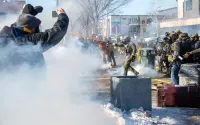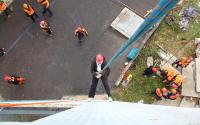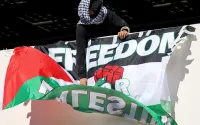27 March 2007
American and Iraqi officials are seeking to persuade so-called "reconcilable insurgents" to join forces against al-Qaeda as the terror network steps up attacks on both Islamic sects in Iraq, the departing U.S. ambassador said Monday.
Zalmay Khalilzad said U.S. Embassy and military personnel as well as Iraqi government officials had met several times with representatives of insurgent groups that had opposed the U.S.-backed political process but he ruled out any contacts with al-Qaeda in Iraq, which has been blamed in many of the high-profile suicide bombings that have killed hundreds.
"We have had discussions with those groups," Khalilzad told reporters in Baghdad. "They are continuing to take place and I think one of the challenges is how to separate more and more groups away from al-Qaeda."
He said some tribal leaders and even some insurgents in Sunni Arab areas already have turned against al-Qaeda, increasingly frustrated with the violence that has killed more Iraqi civilians than U.S. forces.
"Iraqis are uniting against al-Qaeda," he said. "Coalition commanders have been able to engage some insurgents to explore ways to collaborate in fighting the terrorists. These insurgents are also in touch with the government seeking reconciliation and cooperation in the fight against the al-Qaeda terrorists and joining the government in a reconciliation program."
He said the U.S. hopes to build on that momentum.
"We have talked to groups who have not participated in the political process who have ties with some of the insurgent groups who are reconcilable insurgents," he said. "The terrorists are irreconcilable. There cannot be reconciliation with al-Qaeda. They have to be brought to justice, but there are groups that resisted the democratic change, the change in Iraq.
"It is our goal to get those groups to be reconciled. to accept to embrace this new Iraq and that will be a victory, a success for the change that has taken place," he added.
His remarks came during a farewell news conference in the heavily fortified Green Zone, home to the U.S. and British embassies as well the Iraqi government headquarters.
Khalilzad, President Bush's nominee to be the U.S. ambassador to the United Nations, is scheduled to leave Iraq later Monday, officials said. He is being replaced by Ambassador Ryan Crocker, who is transferring to Iraq after 2 1/2 years in Pakistan.
Khalilzad declined to provide details about the contacts with insurgent groups, citing security concerns.
But he told The New York Times in an interview published Monday that he held talks last year with people believed to represent them before and after the Feb. 22, 2006, bombing of Shiite shrine in Samarra, which triggered a vicious cycle of retaliatory sectarian violence.
The meetings — some of which took place in Jordan — began in early 2006 and included self-described representatives of the Islamic Army of Iraq and the 1920 Revolution Brigades, unidentified American and Iraqi officials told The Times.
Khalilzad said he believed Iraq was heading in the right direction but cautioned that Iraqi leaders must understand that U.S. voters were increasingly impatient with the war.
The ambassador, who is leaving his post after 21 months that had seen a massive increase in violence in Baghdad overall, declared that insurgent and militia attacks had decreased by 25% in the six weeks since the start of U.S.-Iraqi security plan on Feb. 14. Sectarian violence, however, has erupted in recent days in a string of mixed Sunni-Shiite towns south of the capital.
"I know that we are an impatient people, and I constantly signal to the Iraqi leaders that our patience, or the patience of the American people, is running out," said the Afghan-born Khalilzad.
He accused al-Qaeda of fueling the violence by using car bombs to provoke Shiite groups into targeting Sunnis, but he warned the group also was targeting Sunnis themselves in an effort to derail the Baghdad security plan. A suicide bombing also seriously wounded Iraq's Sunni Deputy Prime Minister Salam al-Zubaie on Friday in his heavily guarded compound in the capital.
"Certainly they are going after Sunni figures and Sunni areas as well so they've declared war on both sects now," the ambassador said.
In Iskandariyah, 30 miles south of Baghdad, authorities imposed an indefinite curfew after two people were killed and two others wounded in sectarian clashes sparked by an attack Monday by suspected Shiite militants on a Sunni mosque, police said.
Iraqi and U.S. forces sealed off the area where the mosque is located, but clashes erupted elsewhere in the town.
The mosque was slightly damaged by rocket propelled grenades fired by the assailants.
In Mahaweel, a mainly Shiite town 35 miles south of Baghdad, a bomb planted near a Sunni mosque went off Monday morning, damaging the building but causing no casualties, police said.
The targeting of the mosques came one day after suspected Shiite militants attacked a Sunni mosque in Haswa, a town near both Iskandariyah and Mahaweel. The attack was in apparent retaliation for a suicide truck bombing against a Shiite mosque that killed 11 people on Saturday, also in Haswa.
Aides to Prime Minister Nouri al-Maliki have said that Washington has signaled that he must make progress on a series of benchmark legislative and political measures by June 30 or face a withdrawal of American support for his government.
The United States has denied making the threat but Khalilzad was clear Monday that al-Maliki was under heavy U.S. pressure to move rapidly on several issues, especially a law that would provide a fair distribution of Iraqi oil wealth among all ethnic and sectarian groups, a measure that is especially important to the White House.
He also said the Iraqis need to act on political and sectarian reconciliation between Sunnis and Shiites, and on amending the constitution to make it more palatable to the Sunnis. Despite repeated promises of quick action from the Iraqis and heavy pressure from the Americans, those measures still await action in parliament.






